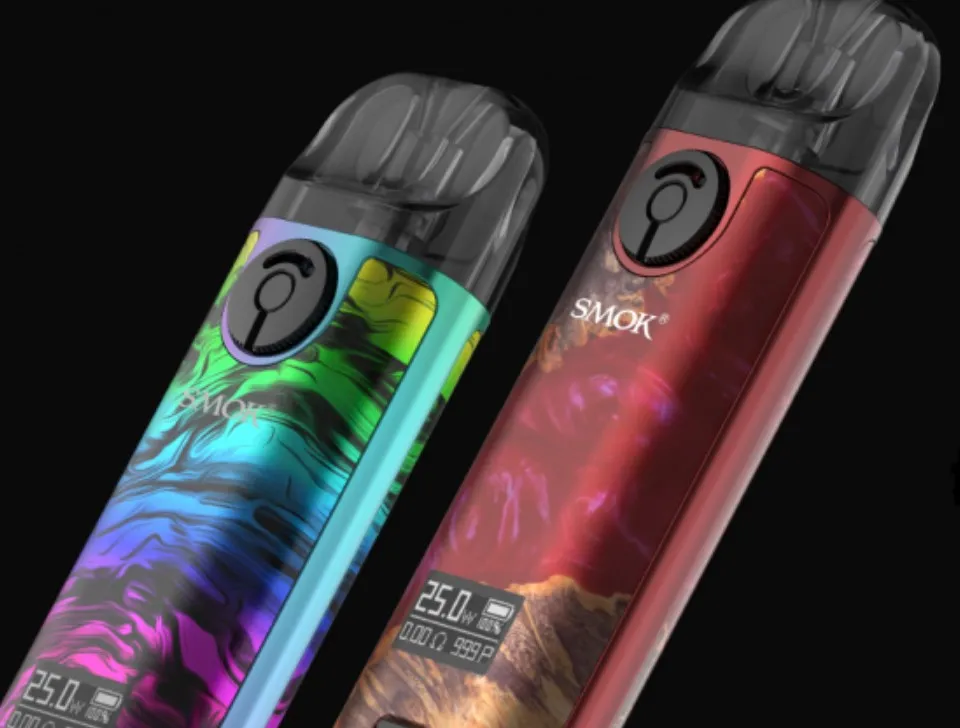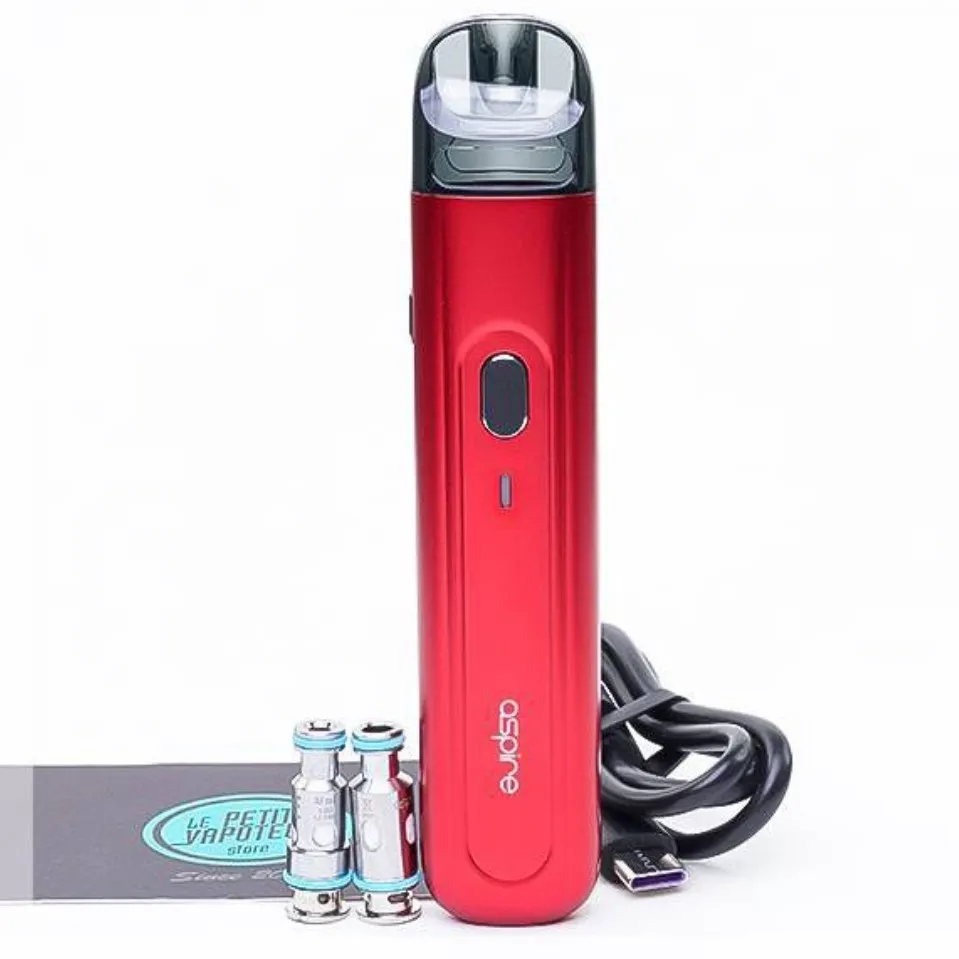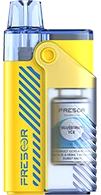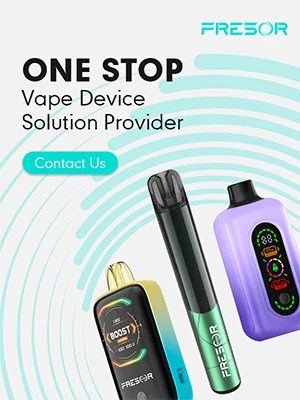Best Pod Vapes of 2024: Expert Picks for Quality and Performance

28 March 2024
Are you looking for the best pod vape of top-notch quality? This article will find 2024's best kits of pods and how they are different and most demanded from others. The list by FRESOR includes the details and functions of the top 10 best pod kits. 2024 is the year of vape products.
The market is rising with increased demand and popularity for pod vape kits all over the world. These electrical devices are becoming a new trend that serves functionality and simplicity.
Pod vapes are now the go-to products of vapers who stay in the aesthetic world and want a commanding experience.
The Popularity of the Best Pod Vapes in 2024
FRESOR focuses on the demanding pod vapes and their kits based on their users' ratings and acceptance in the community of vapers. A new beginner trying to learn more about the vaping culture and an experienced vapor in search of trendy pods will find the guide beneficial.
While reading this article to the end, you will get to know every aspect of pods and vapes, the features of each product, and the specifications. If you own the firm that sells these devices, you will also find exceptional selling factors for each product. Doesn’t matter if you are looking for compact pods and searching for potential performance of pods and powerful vapes, we have covered you from every side.
Top Best Pod Vapes in 2024
1. Fresor P10000 by FresorTech

https://www.fresortech.com/fresor-p10000
Focusing on the rise of the vaping industry, FresorTech’s Fresor P10000 combines the customer approach and advanced technology in vape production. We serve the requirements of users’ tastes through their remarkable products. The one unique feature of Fresor P10000 that makes it high quality is the durable life of the pod’s battery. It is a perfect pick for people who travel a lot and seek pod vapes that have lasting life and don’t need frequent charging.
Besides this, users can have lengthy vaping sessions. The Fresor P10000 has a generous amount of e-liquid in the pod. It has a big tank capacity of e-liquid, ensuring that people who are fond of vaping can experience uninterrupted vaping. They will find it an extra convenient product point as they won’t have to refill it repeatedly.
FresorTech has focused on its product designs a lot. That means Fresor P10000’s design catches the customers’ attention, and its convenient features appeal to them. Its clean and sleek design ensures it matches your everyday style, and its lack of complexity means it has a durable life.
The company focuses on the material used in its construction, which must meet the requirements for regular use and bear any mishap that happens to it. So, the product's overall value is 9/10 according to the users who opt for it.
2. Fresor Click M3 by FresorTech

https://www.fresortech.com/fresor-click-m3
People who live for traveling and choose the pods that are best in functional ways and are easy to carry must opt for Fresor Click M3 for their vaping experience. It is a valuable addition to the vape and pods industry as it is explicitly designed for the customer’s convenience.
The pod size is not so big, therefore proving an ideal companion for travelers. It will fit in your fully loaded bags, side pockets, purses, and even in your pants pocket without making you feel heavy.
Its small size doesn’t mean the company compromises its flavor and battery quality. The Fresor Click M3 has a coiled technology of advanced quality that provides a rich experience to the user. It satisfies the person’s taste with its various flavors, and while comparing it to other brands with complex design and low battery life, the M3 is a perfect puff.
Its coil technology is the most unique feature that sets it apart from others. It ensures the user gets the perfect puff flavor and that it evaporates efficiently. This coil satisfies all vaping styles, whether you follow the mouth-to-lung or direct-lung style. Stay assured of the consistent experience and flavors from Click M3 pod.
3. Vaporesso Xros 3

https://e-litecigs.com/products/vaporesso-xros-3-pod-kit-1000mah
The Xros series of the pod world is the most trending pod vape. Its advanced and latest product is the Vaporesso Xros 3, which is the customer’s first choice for an excellent vaping experience. It is popular for its design and style, as it is lightweight and slim, has a size of 115.1 x 23.6 x 13.7 mm, and is easy to carry. The pod system of the Xros 3 is advanced, where the pod's weight is like nothing.
The product is best for people who prefer comfort and trends over budget. The durable and strong magnets in the pod make its installation system simple. At the same time, a 2ml capacity of 2 pods in the Xros 3 pod system is perfect for a good vaping experience. Upon inhaling, the flavor will be super rich and last two weeks, which will gradually vanish. It is what the satisfaction vapers want.
It is quite useful that Xros 3 magnets are compatible with all the Xros series models. The product is now a go-to for people fond of pods. They have good airflow, rich flavor, and long-lasting battery life, making them perfect for all-day vaping. It is easy to use, simple to carry, and perfect for replacing cross pods with a Top fill as a game changer.
4. Vaporesso Xros 3 Nano

https://e-litecigs.com/products/vaporesso-xros-3-nano-kit
In the Xros pod system series, XROS 3 NANO is a new addition with some super handy and helpful features. As its name suggests, the pod has a small, compact size with a sharper square design and an advanced clear layout with premium structures.
The Xros 3 Nano’s body is constructed with plastic and metal that is strong and durable. The product is compatible with Xros models and comes in ten different colors. Because of the Axon chipset and installation of Corex heating software into the Pods, their performance is greater than that of other brands. At the same time, a small amount of direct-to-lung vaping experience can be obtained with a 0.6-ohm mesh pod, which was found to be most effective with nic salt in less than 25 mg.
Xros 3 Nano pod of 0.8-ohm works perfectly for mouth-to-lung style and is excellent for 20 to 50mg salts of nic. In the pod, two air flows are found for MTL: (1) tight and (2)loose. You can refill the pods multiple times as they are leak proof. The pod lasts 2 to 3 ml on a single charge, with a 1000mAH battery capacity. It has a complete charging duration of 50 minutes.
An LED light on the front shows the battery % and adds aesthetics. The overall features of the Xros series are the same, with slight differences in Xros 3 Nano compared to Xros 3.
5. Uwell Caliburn A3

https://e-litecigs.com/products/uwell-caliburn-a3-pod-kit-520mah-13w
There is not a single person from the vaping industry who is unaware of the Uwell pod series. The Caliburn A3 is its newest edition with only a few changes from the previous A2 version. The pen's body is designed with aluminum for strength, with a mouthpiece of aluminum alloy for a comfortable vaping experience.
It is available in six different colors with a button feature to lock and unlock it. The pod has a capacity of 2ml with a battery size of 520 mAh. The pen has greater charging time as the pod needs 30 minutes for complete charging.
Though the pod features an advanced cooling material, the unique 10-ohm works well and is similar to the previous version, A2. In mouth-to-lung style, the flavor remains the same; on a single charge, it produces 1.5 pods. The nic salts of power 30-50 mg and freebase juice of 0 to 9 mg work fine.
6. Smok Novo 4

https://www.vapebazaar.pk/product/smok-novo-4-25w-pod-kit/
It belongs to the new series of Novo. It contains all the essential elements that the first kit of any new vaper needs. This Smok Novo vape is super simple to use with a single-button feature. The design comes with an easy pod-filling system and push-in coil installation.
The super easy installation and usage process of this Smok Novo 4 makes it an ideal choice for beginners. Well, its additional features like an OLED screen and adjustable airflow make it a more attractive piece. Both of these features allow you to explore your vaping journey.
The standout feature of Smok Novo 4 is its super adjustable airflow wheel. The adjustment control feature allows you to make changes in the airflow by making it more airy sometimes and restricted inhale just to play around with your vaping experience.
The incorporation of a tiny OLED display screen shows data. This feature helps you keep track of your device status and how well it's working.
7. Aspire Felxus Q

https://vapetown.pk/product/aspire-flexus-q-pod-kit/
The Flexus Q of Aspire is an admirable coil device. The kit comes with both 0.6 ohm and 1.0 ohm coils. Both coils have an easy installation process with just a push-in phenomenon. When you hear the click sound, it means it's installed. You can also easily remove them by pulling them out.
The pod can work for months with a little care and lookout. This makes it a much more sustainable option as compared to disposable vapes. The filling hole of the pod is also quite accommodating which goes well with most nozzles of the bottles.
The recharging capability of Flexus Q is fast. It just takes 30 minutes to fully charge up. Well, overall it is an ideal piece but with little drawbacks. This device is best for beginners due to its simple and easy-to-use features, but most experienced vapers who want to have more from vapers do not go well with this one.
8. Aspire Vilter

https://stickyfingerspakistan.com/products/aspire-vilter-fun-pod-kit
Usually, when you just move on from your smoking habit to your vaping journey. In the start, it's normal that you miss the feel and touch of physical smoking. Well, if you are one of them, then this Aspire Vilter is the perfect vaping device for you. This device gives you a closer experience of physical smoking.
The design of Aspire Vilter comes with artificial tips of paper filters. These paper tips are basically responsible for giving you the same traditional cigarette feel through a vaping device.
Moreover, these tips are super easy to use with no fuss which makes Aspire Vilter a perfect companion to quit smoking. Aspire Vilter comes with buttonless design features, inhale draw, pods with fixed-coil, restricted traditional cigarette draw, and automatic output. All of these great features altogether make Aspire Vilter an amazing partner for a beginner who just started his vaping journey.
Frequently Asked Questions
What parameters to consider while opting for any pod vape?
People who use vape need to be very careful when selecting the best pod vape for themselves. While choosing one, they must consider if the pod vape is rechargeable, has a long-life battery, has e-liquid capacity, and is user-friendly or not. Apart from this, ensure the pod vape contains coil installment and has an adaptable airflow so that you can meet your style while having functionality.
Can beginners use Pod vapes?
Pod vapes are easy and simple for any user, so if any beginner wants to try it, they can. A lot of pod vapes come with easy functions with complexities. Therefore, a new user finds it interesting and feels great upon every use.
Are different e-liquids good to use in Pod vapes?
Different brands of pod vapes now offer multiple flavored e-liquids that contain freebase and salted nicotine. When refilling the new flavor into your pods, ensure the compatibility of your pens because many pens are designed with coil resistance and complex designs.
Final Thoughts
The vaping culture inspires people to start with it and make people use pens that meet their styles and functionality. The top-notch pod vapes that you can opt for in 2024 are listed along with their features and specifications. These pods are listed here based on the user's wants and the durable life of pens.
The best puffs that you opt for completely depend on how you want them to be and where you use them. If you find any more pod vapes that are competing with them and feel they should be on this list, kindly enter them in the comment section.

























